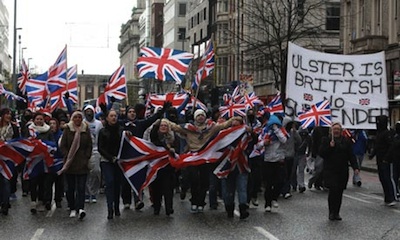
With tensions again rising in the north of Ireland, US mediator Richard Haass held a round-table meeting of the five main Stormont parties today [Friday] on the three key issues of sectarian parades, flags and symbols, and the legacy of the past.
Mr Haass returned to the United States after the meeting, but will return to Ireland in December for possibly the final phase of talks.
Today’s talks were the third round of discussions between Haass and the Stormont parties. The US diplomat described them as “serious, thoughtful and creative”. He said he still believed they could find a consensus before the end of the year.
Mr Haass said he had been “affected” by his meetings with groups of victims. “Speaking if you will, personally rather than professionally, it is impossible to come away from these meetings with victim and survivor groups and not be affected,” he said.
Over the past two months the former special envoy and his team have met between 50 and 60 interest groups and have received around 500 submissions to an online consultation.
On this visit, the diplomat also met the Bloody Sunday relatives and other groups in Derry, while his team held talks with the Protestant Orange Order and nationalist residents groups in Portadown and Belfast.
And despite a definitive statement by the Police Federation (which represents members of the PSNI) that the UVF has “come off ceasefire”, a colleague of Mr Haass met with senior members of that organisation.
Meghan Sullivan held talks at a loyalist protest camp at Twaddell Avenue. The camp has continued since the Parades Commission banned a sectarian parade from passing through republican Ardoyne on the evening of the Twelfth of July.
Although illegal, an encampment of loyalists still demanding to march through Ardoyne has been allowed to remain in place for over five months now. Loyalists are again feared to be orchestrating large-scale disturbances in the run-up to Christmas.
Leading flag protester Jamie Bryson insisted that demonstrations planned for Tuesday December 3 -- the first anniversary of the decision by Belfast City Council to limit the flying of the flag to designated days -- would be “peaceful civil rights protests”
However, the demonstrations are expected to be held at 6pm, which will coincide with rush-hour traffic. Last year, similar flag-protest demonstrations served as roadblocks which brought Belfast to a virtual standstill.
A loyalist march through Belfast city centre on Saturday November 30 -- with up to 10,000 participants and 40 bands -- has also been organised to mark the first anniversary of the Belfast City Council decision. The Parades Commission and the PSNI have give permission to the parade, but have been unwilling to reveal the identity of the organiser. Permission has also been sought by loyalists for another flag protest on Saturday December 14.
Belfast Sinn Fein councillor JJ Magee slammed the plans. “Political unionism needs to put a stop to these idiotic attempts to bring Belfast city centre to a standstill in the lead-up to Christmas,” he said.
“What egotists like Bryson hope to gain by this type of action is baffling. A democratic decision was taken around the flag and no amount of protests is going to change that.”
Sinn Fein also caused some controversy earlier this week when it chose to reveal its written submissions. At the outset of the process in September, Mr Haass asked the talks participants not to make their positions public.
Sinn Fein said that the decision to publish had been taken unilaterally in effort to foster debate. “We felt it was important to kick-start discussions in relation to these key issues,” said negotiator Sean Murray.
“We believe there should be a public dimension to the discussions because after all they are societal problems and not just down to the political parties.”
Other members of Sinn Fein delegation to the Haass Talks are Gerry Kelly, Jennifer McCann, and Mitchel McLaughlin.
![[Irish Republican News]](https://republican-news.org/graphics/title_gifs/rn.gif)
![[Irish Republican News]](https://republican-news.org/graphics/title_gifs/harp.gif)

